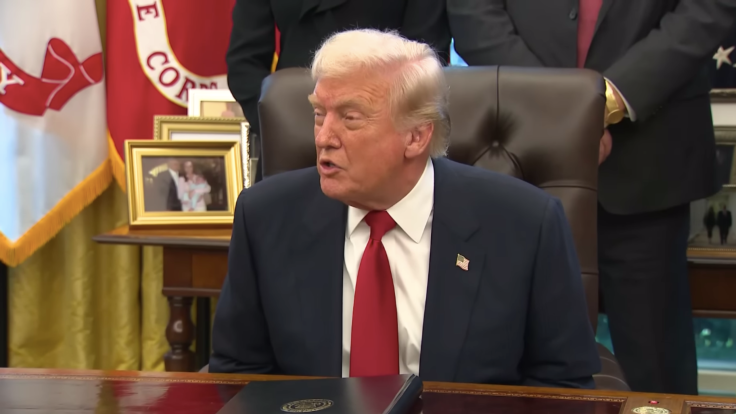Trump's Visa Crackdown: 'Heavy' Foreign Visitors Told They May Be Barred From The U.S.
Internal cable urges consular officers to assess long-term medical costs when granting visas.

A fresh State Department directive instructing consular officers to consider chronic illnesses, including obesity, when deciding visa applications has provoked alarm among immigration experts and rights groups.
The guidance, circulated to U.S. embassies and consulates and examined by KFF Health News, advises officers to weigh whether applicants have conditions that 'can require hundreds of thousands of dollars' worth of care and to judge whether they might become a 'public charge'. That language explicitly names cardiovascular disease, respiratory illnesses, cancers, diabetes, metabolic and neurological disorders, mental-health conditions, and obesity as factors that warrant extra scrutiny.
Advocates say the move dramatically broadens medical grounds for inadmissibility, while the administration frames it as protecting taxpayers from future healthcare burdens.
What The New Guidance Says And Why It Matters
The cable, dated 06 November 2025 and reviewed by public-health reporters, instructs visa officers to assess whether an applicant 'has adequate financial resources to cover the costs of such care over his entire expected lifespan without seeking public cash assistance or long-term institutionalisation at government expense'. It also recommends considering the health of dependents, even if they are not applicants themselves.
For decades, medical screening for U.S. visas concentrated on communicable diseases and required vaccinations; this directive expands the checklist to include common, chronic, and non-communicable conditions that are costly but largely managed in day-to-day life. Legal specialists warn that consular officers, who are not medical practitioners, will be asked to make speculative judgements about future healthcare needs, a task outside their usual remit.
The administration, meanwhile, argues the policy is consistent with the Immigration and Nationality Act's public-charge ground of inadmissibility and is intended to ensure immigrants will not be a burden on U.S. public resources. A State Department spokesman emphasised that 'entry to America is a privilege, not a right', a line echoed by departmental spokespersons in recent media briefings.
Legal And Practical Challenges
Immigration lawyers say the guidance collides with longstanding Department rules that discourage speculative denials. Charles Wheeler of the Catholic Legal Immigration Network told KFF that the cable's instruction to imagine 'what could lead to some sort of medical emergency' is legally dubious and risks arbitrary decision-making. The State Department's own Foreign Affairs Manual has, until now, cautioned against denying visas on hypothetical future conditions.
Practical problems are immediate. The cable gives wide discretion but offers no clinical thresholds, no body-mass index cut-off, no list of diagnostic codes, leaving officers to infer severity from sparse paperwork. Fragomen, a leading immigration law firm, notes applicants may be forced to marshal detailed financial records, employer insurance statements, or affidavits of support to overcome a health-based presumption. That will inevitably slow consular processing and, critics warn, entrench bias against older applicants, people from countries with higher chronic-disease prevalence, and marginalised groups.
Civil rights and immigrant-advocacy groups contend that the policy will have a chilling, discriminatory effect. They argue that chronic illnesses are not evenly distributed globally and that economic status, genetics, and access to care, not moral worth, determine health. Organisations that provide legal aid foresee a steep rise in appeals and requests for reconsideration.
What Applicants Should Know
For most short-term visitors, tourists, or business travellers, routine medical exams are generally not required, and the new guidance is less likely to be applied. But for immigrant-visa hopefuls or those seeking permanent residency, the cable signals a more intrusive health and financial inquiry. Applicants should be prepared to document health insurance arrangements, financial resources, and the medical needs of dependents as part of their dossiers. Immigration lawyers recommend consulting counsel early and collecting thorough supporting evidence to rebut any suggestion of likely future public dependency.
The cable's reliance on speculative future costs, rather than present incapacity or communicable disease, marks a substantive shift in how the administration interprets admissibility. Whether courts will sustain decisions grounded in such predictions is likely to be tested in litigation.
'The guidance hands consular officers an unenviable task: to guess the future of a stranger's health and finances,' said one immigration attorney who asked not to be named. 'That is both practically and legally precarious.'
Small gestures of policy can produce large human consequences. For thousands planning to travel, study, or reunite with family in the United States, this directive will now form part of an already fraught calculus.
The new guidance raises fundamental questions about fairness, medical expertise, and the relationship between health and migration.
© Copyright IBTimes 2025. All rights reserved.





















